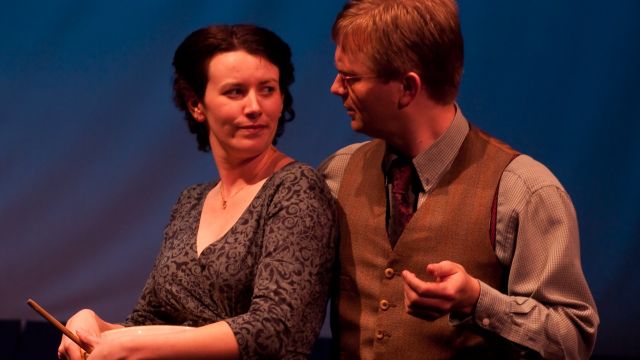A Voyage Round My Father by John Mortimer
With his childhood dominated by his witheringly intelligent, sarcastic, grumpy bully of a father who happened to be blind, you might have expected Mortimer’s autobiographical play to be maudlin. Voyage Round My Father is certainly poignant, but mostly it's very funny. Canberra Rep’s production is a thrill to watch: clever, sympathetic and nuanced, and full of visual ironies.
Whenever tragedy delivered with humour, it’s important to find a balance—Augustine Burrough’s autobiographical Running With Scissors was so funny that it almost undermined the abuse. WAAPA teacher McGregor, in this his 34th production for Rep, offers reality in small but sharp doses so that even while I was laughing, I would be struck by the delivery of isolated lines emphasising the pathos of this father-son relationship and at times outright sadism from the father. Speaking before the show, McGregor points out the absence of affection from his father affected Mortimer's choices, driving him to be both a high profile lawyer and a writer. “He needed to have people’s praise all the time, and I think that’s why he went into the high profile trials like the Oz trial. He needed notoriety, he needed to be held up by people because he had a really damaged childhood.”
Anyone who does a modern scriptwriting course will be smashed around the head with a list of inviolables and an absolute formula, giving rise to a tendency towards pasty pilgrim’s progressy pieces heavy on the syrup. A Voyage Round My Father doesn’t resemble the modern factory produce in any way, and it’s considered Mortimer’s finest play. However, it does offer some very significant challenges: direct narration to the audience, a very large cast some with tiny parts, a time span of nearly 40 years to be presented in a couple of hours, several significant child parts, and worst of all, over 30 scene changes. This production has overcome these difficulties seamlessly. Director Ross McGregor and designer Russell Brown used revolving stage and a very simple set with cloth walls, a moveable curtain to screen scene changes, the minimum of almost all white props, and plenty of gentle, subtle lighting effects suggesting movement in place and time. This approach augments the feel of reminiscence, and injects some of McGregor’s and Brown’s own nostalgia reflecting their connection with and affection for Canberra Rep which spans decades.
In spite of the character’s flaws, John McCarthy plays the blind father with some sympathy. During one of the lightning fast set changes he has to walk evenly off the stage while it revolved, and I was so immersed in the story that I momentarily worried that the blind man might trip. Zach Raffan plays the son who learns to hide his hurt with bemusement very effectively. All the child players come across well, particularly young Pippin Carroll who gives a marvellous performance (as he did in last year’s Ginger Meggs and the Missing Link).
Cathy Bannister
Subscribe to our E-Newsletter, buy our latest print edition or find a Performing Arts book at Book Nook.

